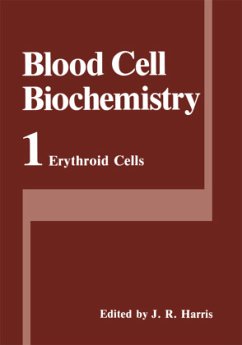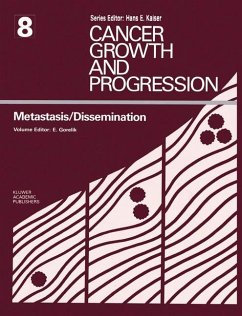
Biochemistry and Molecular Genetics of Cancer Metastasis
Proceedings of the Symposium on Biochemistry and Molecular Genetics of Cancer Metastasis Bethesda, Maryland - March 18-20, 1985
Herausgegeben: Lapis, Karoly; Liotta, L. A.; Rabson, A. S.
Versandkostenfrei!
Versandfertig in 1-2 Wochen
115,99 €
inkl. MwSt.

PAYBACK Punkte
58 °P sammeln!
The success rate for treatment of primary neoplasms has improved sig nificantly due to improved surgical, radiotherapy, and chemotherapy methods, and by supportive patient care. In contrast, the treatment of cancer metastases, the cause of most cancer deaths, has not been very successful. Approximately 50% or more of patients with primary malignant neoplasms already have established metastases. Consequently, the most important problem in cancer treatment is the destruction or prevention of metastases. Metastases research has obvious clinical importance. Yet it has only been recently that inves...
The success rate for treatment of primary neoplasms has improved sig nificantly due to improved surgical, radiotherapy, and chemotherapy methods, and by supportive patient care. In contrast, the treatment of cancer metastases, the cause of most cancer deaths, has not been very successful. Approximately 50% or more of patients with primary malignant neoplasms already have established metastases. Consequently, the most important problem in cancer treatment is the destruction or prevention of metastases. Metastases research has obvious clinical importance. Yet it has only been recently that investigators have attempted to study the mechanisms in volved in this process. This is in part due to the complexity of metastases formation. A metastatic colony is the result of a complicated series of steps involving mUltiple tumor host interactions. It is expected that multiple biochemical factors and gene products derived both from the host and the tumor cell may be required for the metastasizing tumor cell to invade, survive host defenses, travel in the circulation, arrest and adhere in the target organ, invade out, and grow as a metastatic colony. Some of these factors have recently been identified by investigators who have focused on individual steps in the metastatic process and have employed new technologies in immunology, biochemistry and molecular biology. The purpose of this volume is to capture some of the excitement in the field of metastases based on such new discoveries.














